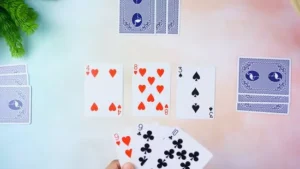
Why Understanding Ranges Is Critical in Poker Strategy: Unlocking the Secrets of Successful Decision-Making at the Tables
In the world of poker, one of the most vital skills a player can develop is the ability to understand and manipulate hand ranges. Many players focus on the strength of their own hand, but the key to success lies in understanding the range of hands that your opponents could have at any given point in the game. This knowledge is essential for making informed decisions, whether you are folding, betting, or raising. The concept of ranges is particularly important in no-limit Texas Hold’em, where each decision can dramatically impact your chances of winning a pot.
At its core, a “range” refers to the spectrum of hands that an opponent might hold based on the actions they take during a hand. While it may seem intuitive to assume your opponent has a specific hand, the reality is that poker is a game of uncertainty, and ranges help bridge this gap. In fact, the best poker players are those who can accurately deduce an opponent’s possible hand range and adjust their strategy accordingly.
One of the first steps in understanding ranges is recognizing that no one hand is ever truly “the best” in poker; rather, a good hand is always context-dependent. For instance, pocket aces may be the best starting hand in Texas Hold’em, but if an opponent raises aggressively from early position and another player calls, your aces’ value diminishes, and you must consider the range of hands those opponents could hold. Your hand is only strong when compared to the range of hands your opponents may have.
Understanding ranges can also help you determine the strength of your hand relative to the board texture. For example, if the board comes out with high cards like the King of spades and the Queen of hearts, an opponent who raises pre-flop from a tight range could have a strong hand, such as a King or Queen, or even a pair of aces or kings. However, if the board shows low cards or a lot of potential draws, your opponent’s range could expand to include weaker hands like suited connectors or small pairs. The ability to narrow an opponent’s range based on the board and their betting patterns is crucial for making accurate decisions throughout the hand.
One of the most common mistakes players make is overvaluing their own hand and failing to think about what their opponents could be holding. This happens when a player becomes too attached to their cards and forgets to consider the overall dynamic of the table. Conversely, a solid player will often think not just about the cards in their hand but also about the possible hands their opponents could have. By factoring in the likelihood of certain hands based on the pre-flop action, board texture, and betting patterns, you can make much more informed decisions that will lead to greater success in the long run.
Advanced players also use the concept of “range-based betting” to increase their chances of winning pots. Instead of simply betting with strong hands and folding with weak ones, they make moves that could represent a variety of possible hands within their range. This strategy creates uncertainty for opponents, making it harder for them to pinpoint exactly what hand the player might be holding. By mixing up your play and using your range in unpredictable ways, you can manipulate your opponents into making mistakes and exploiting their weaknesses.
In addition to individual hands, ranges are also important for understanding post-flop play. As the community cards are dealt, the range of possible hands each player could be holding shifts. Good players constantly update their opponents’ ranges as new information becomes available. For example, after the flop, if you hold a flush draw, your range might include all hands that contain two suited cards, as well as some high pairs or even top pairs with strong kickers. Adjusting your strategy based on how the board develops is an essential part of playing optimally and maximizing your equity in the pot.
Another important factor to consider when thinking about ranges is player tendencies. Every player at the table has their own style, and understanding these tendencies can help you better estimate their ranges. For instance, some players are more conservative and only play premium hands, while others are more aggressive and willing to bluff with a wide range of hands. Recognizing these patterns allows you to make more accurate assumptions about what your opponents might have, and tailor your strategy accordingly.
Finally, mastering ranges is crucial for the long-term success of any poker player. It is a skill that requires constant practice, observation, and adjustment based on the dynamics of each specific game. As poker players grow more experienced, their ability to deduce opponents’ ranges improves, leading to better decision-making and a higher win rate. Whether you’re playing at the cash game tables or in a tournament, understanding ranges will elevate your strategy, increase your profitability, and help you become a more formidable opponent at any poker table.
Ranges are one of the most essential concepts in poker strategy. By focusing not just on the strength of your own hand, but also on the potential hands of your opponents, you can make better decisions and increase your chances of success. Understanding ranges allows you to adjust to the ever-changing dynamics of the game, manipulate your opponents, and maximize your equity in every situation. As you continue to develop your poker skills, honing your understanding of ranges will be a key component of your success at the tables.
You May Also Like:

Learn About & How to Play Thirty-One: A Fun and Strategic Card Game you Probably Never Heard Of?
Learn About & How to Play Thirty-One: A Fun and Strategic Card Game You Probably Never Heard Of? Thirty-One, also known as “Scopone” in some regions, is a classic card game with a rich history that dates back around 500 years. It’s still enjoyed in many variations across Europe and is often compared to popular

Play Tight, But Aggressive: Mastering the Art of Poker Strategy
Play Tight, But Aggressive: Mastering the Art of Poker Strategy In the world of Poker, understanding the concept of playing tight, but aggressive is crucial to becoming a successful player. This strategy is often used by experienced professionals to maximize their potential winnings while minimizing their risk. So, what does it mean to “play tight,

How to Play Poker | The Ultimate Guide to Poker Basics
How to Play Poker | The Ultimate Guide to Poker Basics Poker is one of the most popular and thrilling card games globally, enjoyed in casinos, homes, and online platforms. Whether you’re a beginner or looking to sharpen your skills, learning the basics of how to play Poker is essential. In this guide, we’ll walk

Live Dealer Casinos: The Ultimate UK Guide How to Use E-Vegas.com to Find The Best Live Tables
Live Dealer Casinos: The Ultimate UK Guide How to Use E-Vegas.com to Find The Best Live Tables The world of online gambling has evolved dramatically over the years, with new technologies continually shaping how players experience their favorite casino games. One of the most significant innovations to emerge in recent years is live dealer casinos.

The Million-Dollar Hands: Inside the Biggest Poker Tournament Wins in History
The Million-Dollar Hands: Inside the Biggest Poker Tournament Wins in History Poker has always carried an intoxicating mix of risk and reward, but there are moments when the game transcends the felt and enters legend — when a single hand, a single call, or a single card can alter the course of a player’s life
The Mechanics of Shuffle Tracking & Ace Sequencing: How a Sharp Eye Can Create Thousands in Edge Play
The Mechanics of Shuffle Tracking & Ace Sequencing: How a Sharp Eye Can Create Thousands in Edge Play Card counting is often portrayed as the ultimate skill in blackjack advantage play, a route to winning big in the casino. For many, learning to count cards is a journey, one that involves mastering basic strategy, memorizing

The Path to Becoming a Great Poker Player: Priceless Insights from Daniel Negreanu
The Path to Becoming a Great Poker Player: Priceless Insights from Daniel Negreanu Poker isn’t just a game of cards; it’s a strategic battleground where intellect, patience, and emotional control reign supreme. For anyone who’s ever sat down at a poker table, it’s clear that poker is not a game that can be learned in

The Richest Poker Players in History: The All-Time Money List 2025
The Richest Poker Players in History: The All-Time Money List 2025 Poker has evolved from a simple card game to an international spectacle, attracting the best players from around the world. With the rise of high-stakes live tournaments, poker players have amassed unimaginable wealth, and some have solidified their names as legends in the game.
FAQ: Why Understanding Ranges Is Critical in Poker Strategy
1. What is a range in poker?
A range refers to the spectrum of hands an opponent might hold based on their actions during a hand, such as betting, raising, or calling.
2. Why are ranges important in poker?
Ranges help you understand what hands your opponents may have, enabling you to make informed decisions about when to bet, fold, or raise.
3. How does understanding ranges improve decision-making?
By considering an opponent’s possible range, you can more accurately assess whether your hand is strong enough to win, which helps you avoid costly mistakes.
4. What is the difference between a hand and a range?
A hand is the specific cards you hold, while a range encompasses all the possible hands an opponent could have based on their betting behavior and position.
5. How do betting patterns affect ranges?
Betting patterns, such as the size and timing of bets, provide clues about an opponent’s range. For example, a large bet might indicate a strong hand, while a small bet could suggest weakness.
6. How do you calculate an opponent’s range?
You calculate ranges by observing an opponent’s position, actions, and tendencies, and combining these with the community cards to narrow down the possible hands they could have.
7. What role does the board texture play in narrowing ranges?
The community cards (board texture) affect the strength of an opponent’s hand and can change the range of hands they might be holding. A paired or suited board can lead to different ranges than a dry board.
8. How does range-based betting work?
Range-based betting involves representing multiple possible hands through your betting pattern, making it difficult for opponents to pinpoint your actual hand and increasing your chances of winning.
9. Why should I consider my opponents’ tendencies when estimating ranges?
Every player has unique tendencies—some may play conservatively, while others are more aggressive. Recognizing these patterns helps you predict what range they are likely to play.
10. How can I improve my ability to calculate ranges?
With practice and experience, you can refine your ability to deduce ranges by paying attention to betting actions, positions, and opponent behavior over time. Studying hand histories and reviewing your play is also helpful.
